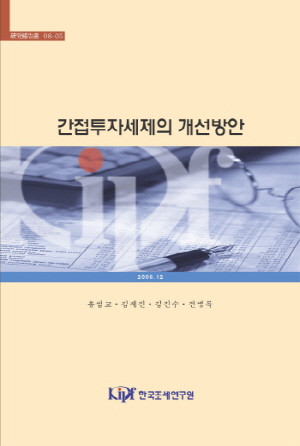Proposing a New Tax Policy on Collective Investments
- Keyword
- 자통법, 주식양도차익과세, 소득원천별과세, 자통법, 주식양도차익과세, 소득원천별과세
- Title
- Proposing a New Tax Policy on Collective Investments
간접투자세제의 개선방안
- Authors
- Beom-Gyo Hong; Jae-Jin Kim; Jin soo Kim; 홍범교; Byung mok Jun; 김재진; 김진수; Beom-Gyo Hong; Jin soo Kim; Byung mok Jun; Jae-Jin Kim; 전병목
- Issue Date
- 2008-12-01
2008-12-01
- Publisher
- KIPF
KIPF
- Page
- pp. 185
pp. 185
- Abstract
- Collective investments are relatively new type of investments, gaining momentum in recent years in Korea. Many factors such as deregulation and globalization of financial markets, introduction of new financial products including derivatives contributed to the increase of investments in funds. By relying on the expertise of fund managers, general investors can expect higher returns though they have to pay some kinds of fees in return.
Recent global financial crisis made general investors more cautious in their investments in funds. But still the changed financial environment will surely make the collective investments a major form of investments in the future. Korean tax authority have made an announcement to reform the tax system related with collective investments. The Financial Investment Services and Capital Market Act that is to be effective in February 2009 allows many new forms of collective investment vehicles. The proposal to reform the current tax law meets many demands for the changed environments. But it falls short of a complete reform due to the neutrality principle between direct investments and collective investments.
This study intends to make up for the shortfalls and tries to make the reform complete. That is to tax the capital gains from stock trading in collective investments. Because the current system excludes the gains from stock trading from the taxable income, it does not allow loss deduction either. That makes the current system very peculiar in the sense that though the total return is negative due to the loss from stock trading, the investors have to pay taxes if they have any income in the form of interest or dividends. The distinction between direct investment and collective investment warrants the different tax treatments. If the distinction is not accepted universally, the introduction of capital gains tax in collective investments first can lead to the same tax treatment in direct investment, ultimately restoring the tax neutrality.
2009년 2월 시행을 앞두고 있는 ‘자본시장과 금융투자업에 관한 법률’은 은행과 보험을 제외한 금융투자업종 간의 칸막이를 없애고, 규제개혁과 투자자 보호 강화를 통해 금융혁신과 경쟁을 촉진할 목적으로 도입된바, 새로운 형태의 간접투자기구의 도입도 허용하고 있다. 따라서 간접투자의 형태는 보다 다양해질 것이며, 증가세도 계속될 것으로 예상되는바, 이에 따른 관련 세법도 정비될 필요가 있다.
이러한 필요성을 인식하고 정부당국에서도 금년도 세제개편안을 통하여 간접투자세제에 대한 정비안을 내놓았다. 그 중에서도 투자소득의 인식시기를 매년 1회 결산시로 하도록 되어 있던 것을 환매시까지 이연할 수 있는 선택권을 투자자에게 준 것은 세제상의 불합리성을 일정 부분 해소한 것이다. 그러나 직접투자와의 형평성 때문에 주식양도차익에 대한 과세가 이루어지지 않음으로 인하여 발생하는 세제상의 불합리성은 그대로 남아 있다고 하겠다. 즉, 주가하락 등 과세대상에서 제외되는 자산가격의 하락으로 인한 손실을 인정하지 않음으로써 펀드자산가격이 하락하였음에도 불구하고 세금을 납부해야 하는 불합리한 측면이 해소되지 않고 있다.
이러한 세제상의 불합리성을 해소하는 방법은 기본적으로 주식양도차익과세제도를 도입하는 수밖에 없다. 양도차익과세제도를 도입함으로써 양도손실을 인정하게 되면, 간접투자로 인하여 투자자금 전체적으로 손실을 보았음에도 불구하고 세금을 내는 불합리성을 해소할 수 있다. 물론 주식양도차익과세제도를 도입함으로써 펀드가 전반적으로 수익을 실현할 경우에는 납부해야 하는 세금이 지금보다 증가할 수 있다. 그러나 국제적인 추세를 보더라도, 자본거래에 대한 거래세보다는 소득과세가 일반적이며, 투자자의 입장에서 보더라도 투자자금이 손실을 보고 있는데도 불구하고 세금을 내야 하는 억울함보다는 이익이 생겼을 때 세금을 내는 것을 보다 쉽게 받아들일 수 있을 것이다.
더욱이 직접투자와 간접투자 간의 형평성도 양 투자로 인한 상품의 성격을 어떻게 보느냐에 따라 결정될 수 있기 때문에 절대적인 기준이 될 수 없다는 점을 감안한다면 투자자들도 보다 쉽게 받아들일 수 있는 간접투자에 대해서 주식양도차익과세를 먼저 시행하고, 직접투자시장으로 확대함으로써 과세의 형평성을 회복할 수 있을 것이다.
그리고 이러한 주식양도차익과세제도의 도입 수순은 파생상품시장에도 영향을 미칠 수 있다. 간접투자 과세대상에 상장주식기반 파생상품도 포함시킴으로써 주식시장과 마찬가지로 간접투자시장에서 먼저 파생상품에 대한 소득세부과를 도입하고, 직접투자시장으로 파생상품 과세를 확대할 수 있을 것이다.
간접투자의 대상이 되는 자산의 종류에 따라 직접투자와 간접투자 간의 세제 차이가 큰 경우에는 이에 대한 고려도 필요하다. 예를 들어, 부동산 펀드의 경우 부동산에 직접 투자할 경우에는 최고 70%의 양도소득세를 납부하게 되어 있는 반면, 펀드를 통한 부동산 양도시, 양도소득이 아닌 배당소득으로 과세되어 세부담 회피가 가능하기 때문이다. 따라서 부동산에 일정 수준 이상을 투자하는 펀드의 경우, 그 발생소득을 직접투자와 동일하게 소득원천별로 과세하는 방안을 검토할 필요가 있다.
투자자가 펀드증권을 환매하지 않고, 펀드가 아닌 기타 투자자 등에게 양도하는 경우의 양도소득세 과세 문제도 해결이 필요하다. 회사형인 투자회사와 사모투자 전문회사의 증권은 소득세법상 ‘법인의 주식 또는 출자지분’에 해당되어 비상장시 양도소득세 과세대상이나, 계약형인 투자신탁의 지분증권은 비과세대상이다. 본질적으로 이들 증권의 타인 양도는 동일한 행위인 데 비하여 형식요건에 따라 과세 여부가 달라지게 된다. 이를 해결하는 방안도 간접투자부터 상장주식 양도차익과세제도를 도입하는 것이 근본적인 해법이라 하겠다. 간접투자세제의 모순을 고려하면 양도손실에 대한 공제를 인정함으로써 차익과세제도를 무리 없이 도입할 수 있을 것으로 예상된다.
- Keywords
- 자통법, 주식양도차익과세, 소득원천별과세, 자통법, 주식양도차익과세, 소득원천별과세
